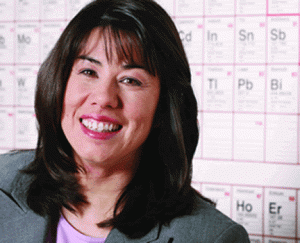by Joanna Rowell
If you ask any scientist why they chose to pursue research as a career, they will often point to an inspirational mentor or teacher. It could be a high school biology teacher showing a student how to dissect a worm, or an undergraduate professor demonstrating how our ancient hominid ancestors made stone tools out of flint. These crucial moments can generate in us a sense of wonder about how our world works, which can provide the foundation for a successful career in science.
Perhaps the very best teachers are able to change our perception of what we think we are capable of doing with our lives. Ami LeFevre, a high school biology and chemistry teacher at Niles West High School in Skokie, Illinois and recipient of the 2012 AWIS Chicago Motivator Award, is one such teacher. Although she started out studying marine biology, and then had aspirations to become a medical doctor, she said that, “eventually I found my way into education.” This turned into a lasting and fulfilling career as a science educator.
LeFevre loves teaching high school students. One challenge she faces as a teacher is to get students to think critically, and, in her words, “to understand that it’s not just about straight memorization, but what you do with that information.” LeFevre also enjoys that she is always learning new things as a science teacher. Part of her job is “keeping up to date with the science and bringing that information to the kids,” which is a part of teaching she finds very intellectually challenging. One of her favorite aspects of her job, however, is helping her students figure out what they want to do after high school, and exposing them to the world of science beyond the classroom.
To do this, LeFevre organizes several career development programs, such as the Girls Empowered by Math and Science (GEMS) conference. This program brings together women from various points in their scientific education, including girls in grades 4 through 6, high school students, university students, and women with established careers in science. Past sessions have included a Motorola engineer who guided the girls in the dissection of old cell phones, and an anthropology major from Indiana University who discussed her research on non-human primates. One of LeFevre’s colleagues, Margaret Donnelly, mentioned that at the GEMS conference “the energy and enthusiasm was contagious.” She went on to state that her daughter “began to see how exciting and fun science can be.”
LeFevre is also the main faculty sponsor of the Niles West Chemistry Club. This club allows students to have fun with science by, for example, making ice cream with liquid nitrogen. LeFevre also provides her students with opportunities for science outreach. For example, this year they performed a forensic chemistry demonstration for the younger students at Edison Elementary School. “If you see their faces, you see just how much fun they’ve had,” LeFevre said. “They feel like they’ve done something really special for the younger kids.” The students also reach out to the international community, organizing relief efforts after the earthquake in Haiti and tsunami in Japan. They also shadowed graduate research assistants at Chicago universities such as Loyola and Columbia, and attended the Argonne National Laboratory Women in Science Day.
During our interview, LeFevre told me a striking story that really emphasized the importance of programs such as GEMS. After having performed a chemistry demonstration at her son’s elementary school, LeFevre ran into the mother of a girl in the second grade. This woman told LeFevre that after the chemistry demonstration her daughter said that she “didn’t know that women could be scientists.” The mother thanked LeFevre for changing her daughter’s perception of what women are capable of doing with their lives.
LeFevre is very much aware of these gender stereotypes. “It’s amazing to me that a lot of the girls still believe that boys are better at math than they are,” she said. “Even though they’re great at math, often times they don’t have that self confidence.” By showing girls that women can excel at math and science through programs like GEMS, LeFevre is making a big difference their lives. These programs show conclusively that women can excel at science and that science matters. LeFevre is a true motivator, and we could not be more thrilled that she is this year’s recipient of the AWIS Chicago Motivator Award.

